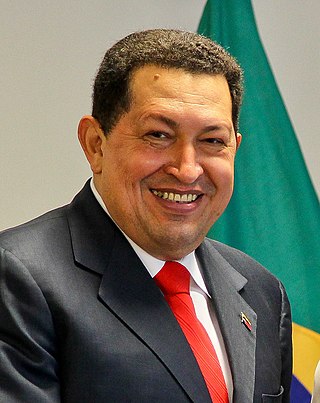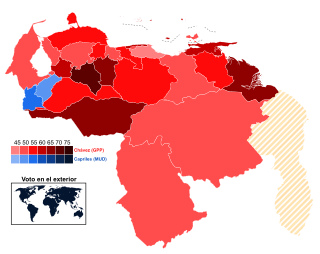
The politics of Venezuela occurs in a framework explained in Government of Venezuela.

Hugo Rafael Chávez Frías was a Venezuelan politician and military officer who served as president of Venezuela from 1999 until his death in 2013, except for a brief period of forty-seven hours in 2002. Chávez was also leader of the Fifth Republic Movement political party from its foundation in 1997 until 2007, when it merged with several other parties to form the United Socialist Party of Venezuela (PSUV), which he led until 2012.

The Fifth Republic Movement was a socialist political party in Venezuela. It was founded in July 1997, following a national congress of the Revolutionary Bolivarian Movement-200, to support the candidacy of Hugo Chávez, the former President of Venezuela, in the 1998 presidential election. The "Fifth Republic" refers to the fact that in 1997 the Republic of Venezuela was the fourth in Venezuelan history, and the Movement aimed to re-found the Republic through a constituent assembly. Following Chávez' 1998 election victory, this took place in 1999, leading to the 1999 Constitution of Venezuela.

The Bolivarian Revolution is an ongoing political process in Venezuela that was started by Venezuelan President Hugo Chávez, the founder of the Fifth Republic Movement and later the United Socialist Party of Venezuela (PSUV), and his successor Nicolás Maduro. The Bolivarian Revolution is named after Simón Bolívar, an early 19th-century Venezuelan revolutionary leader, prominent in the Spanish American wars of independence in achieving the independence of most of northern South America from Spanish rule. According to Chávez and supporters, the Bolivarian Revolution seeks to build an inter-American coalition to implement Bolivarianism, nationalism and a state-led economy.
Bolivarianism is a mix of panhispanic, socialist and national-patriotic ideals named after Simón Bolívar, the 19th-century Venezuelan general and liberator from the Spanish monarchy then in abeyance, who led the struggle for independence throughout much of South America.

Elections in Venezuela are held at a national level for the President of Venezuela as head of state and head of government, and for a unicameral legislature. The President of Venezuela is elected for a six-year term by direct election plurality voting, and is eligible for re-election. The National Assembly (Asamblea Nacional) has 277 members (diputados), elected for five-year terms using a mixed-member majoritarian representation system. Elections also take place at state level and local level.

Democratic Action is a Venezuelan social democratic and centre-left political party established in 1941. The party played an important role in the early years of Venezuelan democracy, leading the government during Venezuela's first democratic period (1945–1948). A decade of dictatorship under Marcos Pérez Jiménez followed, which saw AD excluded from power. With the advent of democracy in 1958, four Presidents of Venezuela came from Acción Democrática from the 1950s to the 1990s during the two-party period with COPEI.

The Movement for Socialism is a democratic socialist political party in Venezuela.

The Radical Cause, stylized as La Causa Я, is a minor left-wing political party in Venezuela, and today part of the Venezuelan opposition to president Nicolás Maduro.

The United Socialist Party of Venezuela is a left-wing to far-left socialist political party which has been the ruling party of Venezuela since 2007. It was formed from a merger of some of the political and social forces that support the Bolivarian Revolution led by President Hugo Chávez.

A constitutional referendum was held in Venezuela on 2 December 2007 to amend 69 articles of the 1999 Constitution. President Hugo Chávez and supporters claimed the changes were needed to initiate the transformation into a socialist country; opponents claimed the reforms would undermine democracy in the country.
Ismael García is a Venezuelan politician. He was the leader of PODEMOS, a socialist party which won the second most seats in the National Assembly of Venezuela in the 2005 election.

Regional elections were held in Venezuela on 23 November 2008 to choose 22 governors and 2 metropolitan mayors. The candidates were selected for a term beginning in 2008 and ending in 2012, when the next regional elections will be held. The 2008 regional elections were the second during the government of Hugo Chávez Frías and the first since he founded the United Socialist Party.

Henri Falcón Fuentes is a Venezuelan politician. He was mayor for two consecutive terms of Barquisimeto, Iribarren Municipality (2000–2008) and governor of Lara State (2008–2017). He was a candidate in the 2018 Venezuelan presidential election.
Didalco Bolívar is a Venezuelan politician, and was Governor of Aragua State from 1995 to 2008. His first three election victories were as a representative of the Movement for Socialism. In the 2004 elections he represented For Social Democracy (PODEMOS), a party he co-founded in 2003.

The Democratic Unity Roundtable was a catch-all electoral coalition of Venezuelan political parties formed in January 2008 to unify the opposition to President Hugo Chávez's United Socialist Party of Venezuela in the 2010 Venezuelan parliamentary election. A previous opposition umbrella group, the Coordinadora Democrática, had collapsed after the failure of the 2004 Venezuelan recall referendum.

Presidential elections were held in Venezuela on 7 October 2012 to choose a president for a six-year term beginning in January 2013.

Bolivarian propaganda is a form of nationalist propaganda, especially in Venezuela and associated with chavismo, Venezuelan socialism. This type of propaganda has been associated with Hugo Chávez's Bolivarian Revolution, which used emotional arguments to gain attention, exploit the fears of the population, create external enemies for scapegoat purposes, and produce nationalism within the population, causing feelings of betrayal for support of the opposition.

Regional and municipal elections were held in Venezuela on 21 November 2021. In the elections, all executive and legislative positions of the 23 federal entities, as well as that of the 335 municipalities of the country, were renewed.
Wilmer José Azuaje Cordero is a Venezuelan politician that has served as deputy in the National Assembly for Barinas state and as a Barinas regional deputy.













